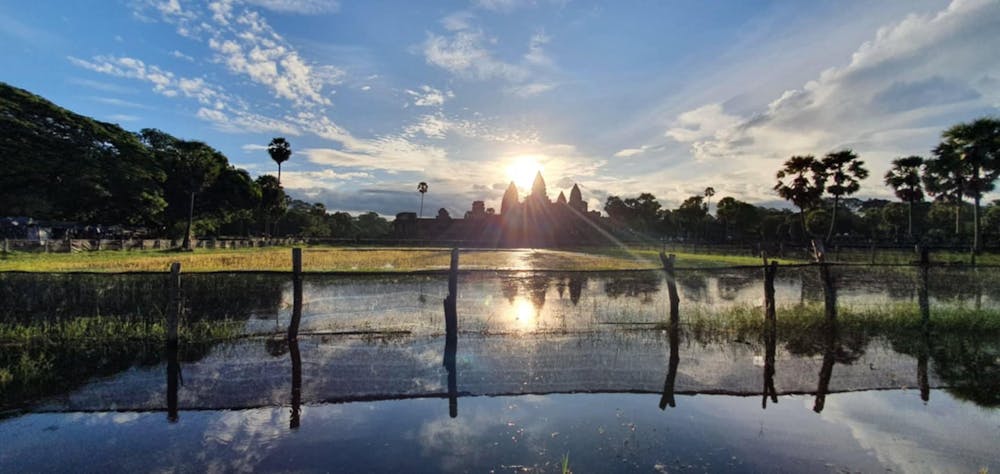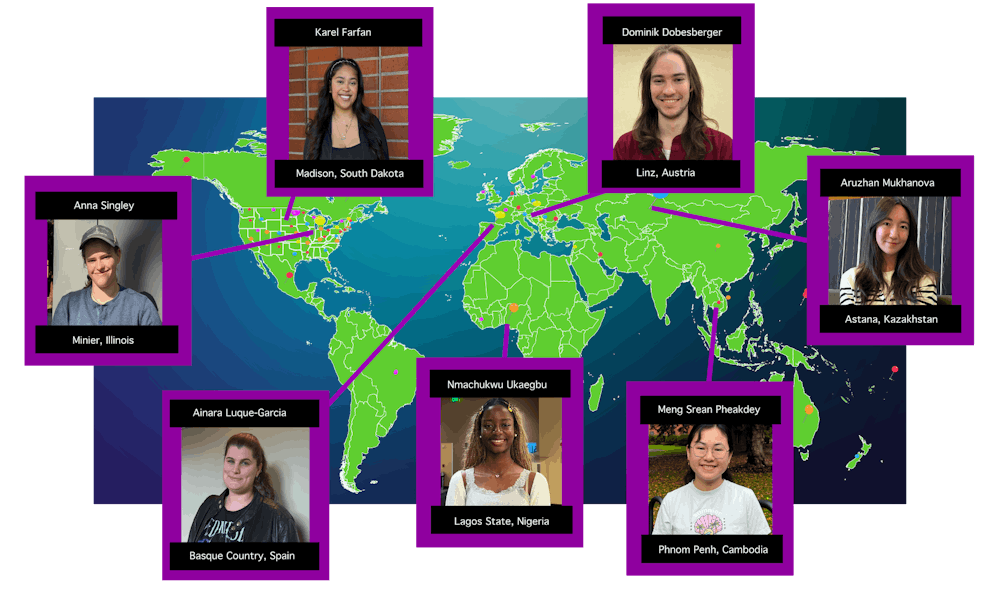From the modern, architectural city of Astana, Kazakhstan, to the small rural town of Minier, Illinois, international and domestic students from far and wide have found their home on The Bluff.
Future nurses, engineers and entrepreneurs travel great distances to experience life as a Pilot. According to the Office of Institutional Research, the University of Portland’s student population is made up of 32 states and 14 countries as of the 2024 school year.
The Beacon spoke with Dominik Dobesberger, Aruzhan Mukhanova, Nmachukwu Ukaegbu, Anna Singley, Ainara Luque-Garcia, Meng Srean Pheakdey and Karel Farfan about their hometowns and transitions to a new environment at UP.

Dominik Dobesberger: Linz, Austria
Graduate linguistics and communications student Dominik Dobesberger calls the industrial town of Linz, Austria home. The city in northeast Austria is walkable with many hills and forests, which his family took advantage of in his childhood.
UP is a partner of the University of Salzburg, which is how Dobesberger first found his way to The Bluff.
Having interacted with Americans in the past, Dobesberger thought he would be more familiar with the culture and people in the US. In his time here, he has discovered that the everyday interactions are different from what he imagined.
According to Dobesberger, the main cultural difference is friendliness. In Austria, it is considered polite not to greet or bother anyone. In America, he wonders where politeness ends and actual friendship begins.
“Everybody wants to chat, and that's very fun and very nice,” Dobesberger said. “But especially in the beginning, it's a bit intimidating. What does that mean? Do you want to be friends? Are you just being polite?”
Aruzhan Mukhanova: Astana, Kazakhstan

Senior business marketing major Aruzhan Mukhanova is from Astana, Kazakhstan, which is a cold, architectural city in Central Asia.
Mukhanova was born in Brussels, Belgium, then raised and taught to speak Russian and Kazakh in Kazakhstan. She started her American higher education at a community college in Washington before she transferred to the University of Portland. Already familiar with the Pacific Northwest, she was at ease with her transition to The Bluff.
“I always wanted to study abroad,” Mukhanova said. “I really love exploring the world outside of my country. I feel more comfortable talking in English, actually, than Russian or Kazakh at this point.”
According to Mukhanova, though the international student community on The Bluff is small, she still manages to stay active on campus by attending cultural events that allow her to meet fellow international students. She says the community at UP is welcoming, especially with other students showing interest in her experiences.

Nmachukwu Ukaegbu: Lagos State, Nigeria
Lagos State, Nigeria is the bustling city sophomore nursing major Nmachukwu Ukaegbu calls home.
“My hometown is very diverse and it's very traditional,” Ukaegbu said. “Our culture is a huge part of who we are, and you can see that in the streets as well. We have a lot of jewelry and we usually tie dye [our] clothes. Our hair is mostly just braids, but there's different types of braids.”
Ukaegbu came to UP’s campus because of its nursing program. But she also says her transition to a new country was anything but smooth. Yet over time, she has found that living internationally has been an additive experience rather than subtractive.
“It definitely takes a lot of your emotional capacity,” Ukaegbu said. “But you're not leaving anything behind, [you’re] just going into a new place. It's like you're adding to who you are and your experiences. So it's just, it's always a gain.”
Ukaegbu’s transition to America has also added to her experiences of new cuisines. According to Ukaegbu, there is no bad food, just food you’re not used to.
“I remember the first time I tried mac and cheese, and I kept telling everyone I hated mac and cheese,” Ukaegbu said. “They're like, what do you mean? Then I tried it again. I was like, this isn't that bad. Then you just keep going, and it gets better.”

Anna Singley: Minier, Illinois
Junior math major Anna Singley’s home is Minier, Illinois. The village is so small that it doesn’t have any stop lights, has one restaurant that is rarely open and a highschool composed of students from eight other small towns.
Singley describes the area to be dependent on agriculture, which reflects the memories of her childhood.
“I’d spend my summers in North Dakota, helping my grandfather out,” Singley said. “He taught me a bunch of different farm skills. That was a big part of the culture [in Illinois]. It's about being connected to the land and knowing how to make the most of it.”
Only knowing the rural environment she grew up in, Singley transitioned to being in a city for the first time when she came to UP.
“There's so many things I hadn't seen, like actually being in tall buildings and [a] stupid one was, [my town] was so rural that we didn't really have trash service, we'd burn a lot of it,” Singley said. “So it was my first time seeing that.”
As one of few to go to college from her hometown, Singley found her way to UP through veteran suicide research. At 15 years old, she received guidance from Associate Dean for Students and Professor Hannah Highlander for COVID-19 research. In 2019, Singley and Highlander co-authored the journal article, “CURE: A Mathematical Model of Suicide Risk among US Veterans.”
In her studies, Singley follows the mantra her grandfather taught her —“You never get a sore back carrying around a good education.”
Ainara Luque-Garcia: Basque Country in northern Spain

The autonomous community of Basque Country in northern Spain is junior psychology major Ainara Luque-Garcia’s perfect blend of rural and urban.
“You can go downtown to the old area of the city and find a lot of tall buildings, cathedrals, brick and bridges,” Luque-Garcia said. “But we also have three beaches, an island and a giant bay. Where I come from, we are surrounded by mountains.”
Before she was a transfer student at UP studying psychology, communications and English, Luque-Garcia was an au pair to a family in Seattle. The international au pair program allows students to go to school while being a live-in nanny for the children of the family. To this day, she considers this family her own.
“The first time I held my brother he was two months and now he is seven,” Luque-Garcia said. “The first time I held my sister she was three days old and she is now six. I have raised them.”
From being raised by her grandparents between San Sebastian and San Pedro, growing up in a San Sebastian Catholic school until she was 17 and pursuing professional handball in San Sebastian and France, Luque-Garcia’s journey to The Bluff has also changed her accent to reflect her many experiences.
“A teacher I had when I was an au pair forced me to take diction and change my accent to sound like I do now,” Luque-Garcia said. “I was raised with people that are from England and family members that live in London. Now this is how I sound.”

Meng Srean Pheakdey: Phnom Penh, Cambodia
Sophomore electrical engineering major Meng Srean Pheakdey grew up right outside the city of Phnom Penh, Cambodia. She remembers the large rice fields she and her brother would run through as children.
Pheakdey came to UP through SHE-CAN, an organization that mentors female students from low-income families in Cambodia to apply to university.
Although she was exposed to American culture online in Cambodia, the most difficult transition for Pheakdey was the English language.
“I think that I can speak [well] with my friends, but it is very hard academically because I am in electrical engineering,” Pheakdey said. “I have to do a lot of math, chemistry and physics and when I was in Cambodia, I never learned [these subjects] in English.”
However, UP’s close relationships with students and professors have been beneficial for Pheakdey in her studies.
“[Unlike in Cambodia] I don't have to prepare my speech to talk to my professor,” Pheakdey said. “I could reach out to them and they could help me with homeworks and all of that, which is very great.”

Karel Farfan: Madison, South Dakota
Senior organizational communication major Karel Farfan came to UP from Madison, South Dakota, where you can get anywhere in town in five minutes. It is a traditional yet tight-knit community.
Though Portland, Oregon is far from South Dakota, Farfan was searching for change away from her hometown, something most of the people she grew up with do not often experience.
Most students new to university life experience a transition period. Farfan’s adjustment to a more diverse and welcoming environment has proved worthwhile.
“Growing up, I was one of maybe three or four people of color in my entire school,” Farfan said. “Coming to UP, it's definitely way more diverse here in that sense. The lifestyle [in Portland] is way faster and people are way friendlier. They're very open here [and] that definitely relieved some of the stress that came with moving to a different area.”
The diverse community at UP has not only benefited Farfan’s social life, but her academic perspectives as well.
“Equity and inclusion, and those aren't even words that are brought up in South Dakota,” Farfan said. “The biggest culture difference has been learning to appreciate my own culture and other cultures, rather than just having one way of thinking.”
Kalena O’Connell is a News Reporter for The Beacon. She can be reached at oconnell27@up.edu.








